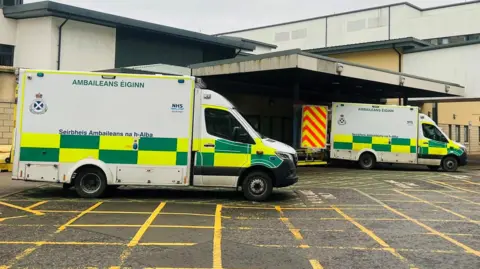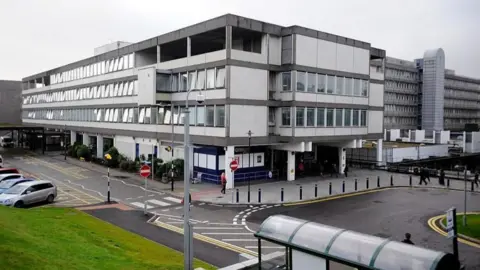Hospital ambulance diversions a 'major warning'
 BBC
BBCNHS Grampian's diversion of some ambulances away from Aberdeen Royal Infirmary (ARI) for a day was a "major warning light" for the health service, a union has said.
The diversion of ambulances was lifted on Friday evening. While it was ongoing, patients requiring immediate life saving care were still being dealt with at ARI, but other patients were taken to other hospitals where clinically appropriate.
BMA Scotland said doctors were "extremely concerned" after a critical incident was declared by the board on Thursday over very high demand on its services.
Health Secretary Neil Gray said the Scottish government was working urgently to help mitigate pressures on the hospital.
Some elective procedures and appointments were also postponed, except for cancer treatment and diagnostic tests.
Dr Iain Kennedy, chairman of BMA Scotland, said the timing of the incident was alarming.
He said: "There is a bed based problem in Aberdeen, there's simply a shortage of beds in Aberdeen Royal Infirmary.
"The fact that this critical incident has been declared in November is extremely concerning.
"We’ve probably got a very cold winter ahead with inevitable seasonal virus outbreaks."
Dr Kennedy said doctors in Grampian felt they were not being heard by NHS chiefs or the Scottish government.
He added: "What they're telling me is that there needs to be far more investment in the community in general practice, so that the doctors and the wider team there can help prevent patients needing to go to hospital In the first place.
"It's right up there as a major warning light of the ongoing crisis in the NHS in Scotland."
 Getty Images
Getty ImagesThe Scottish Ambulance Service (SAS) said it was "working collaboratively" with NHS Grampian to manage the pressure.
Patients were temporarily diverted from ARI for care in Dundee and Elgin.
Those who are west of Elgin and require an ambulance will continue be taken to Raigmore Hospital, in Inverness, to alleviate pressures on Dr Gray’s Hospital in Elgin.
On Friday evening, the heath board said the situation had improved slightly since Thursday and that had allowed the ambulance diversion to be lifted.
A small number of patients were diverted away from the Grampian area during the period it was in place, the health board said.
It added: "Any patients requiring life-saving treatment – for example following a stroke or heart attack – have continued to be admitted, via ambulance, to our hospitals."
The statement continued: “We remain in a board level critical incident."
The situation across the health board remained "extremely pressured", due to the volume of acutely ill patients, delayed discharges, capacity in community healthcare settings and staffing pressures.
It said average occupancy over the last week at ARI had been 111%, and Dr Gray's had been 124%.
NHS Grampian has faced severe pressure in recent years, with staffing problems and multi-million pound overspends.
There have also been serious issues with ambulances forced to queue outside ARI.
Last month, the health board announced plans to reduce the number of ambulances waiting outside the hospital.
The scheme allows ambulance staff to take some patients directly into the initial assessment unit to avoid lengthy queues at the hospital entrance.
The Unison union has opposed the change, saying it would add to the pressure faced by hospital staff.
The Scottish government said it was "working urgently" with NHS Grampian to help mitigate pressures at ARI and provide support.
Health Secretary Neil Gray said "patient safety is paramount".
He added: “This type of sustained pressure that services are facing is not unique to Scotland, similar challenges are being felt across the UK.
“While Scotland continues to have the best performing core A&E departments in the UK, performance is not of the standard we all expect."
The health secretary said investment continued to be made in NHS 24 call handlers and the SAS workforce - with 1,388 more staff recruited since 2020.
